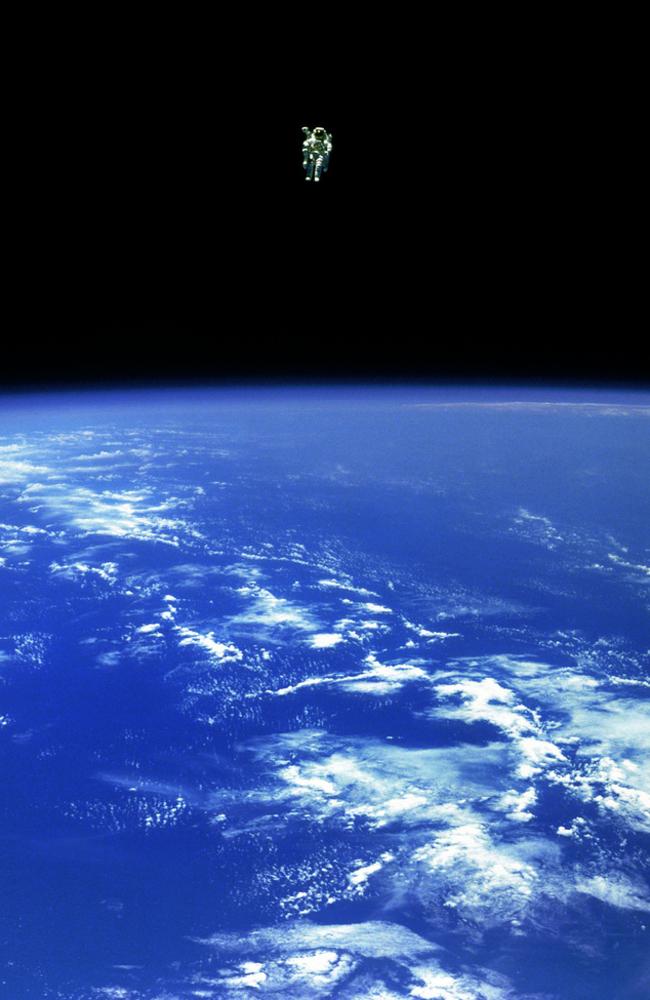Bill Nye: Why we have a need to explore space
SPACE exploration brings out the best in all of us, writes Bill Nye. It is the path upon which we seek answers to two fundamental questions: are we alone? And where did we come from?
- Maybe its us that are the alien freaks
- 68th annual International Astronautical Congress kicks off in Adelaide
- Bill Nye: I hope it’s an Aussie that gets to walk on Mars
THE most recognisable image to everyone on Earth is the image of the Earth as seen from space. Earth from this perspective changes the way everybody thinks about our place in the cosmos, what I like to call our place in space.
We would not have that image, or any of the other images that we associate with space exploration without Australia. This continent is uniquely situated on the Earth’s surface so that we can receive and transmit signals to and from spacecraft as part of what we call the Deep Space Network (DSN). The world thanks you.

Australia has been one of the world’s most important partners in space exploration for more than 60 years. From supporting the Mars exploration Mariner program, to relaying the images from the first Moon walk, to the New Horizons fly-by of Pluto — Australia has been there the whole way.
A meeting of people that includes a great many actual rocket scientists, the 68th International Astronautical Congress, is being held in Adelaide this year. It’s where space professionals from all over the world come together to collaborate, to learn from each other, and to celebrate the extraordinary undertaking that is space exploration.
The IAC is a shining example of the potential that is unlocked when citizens of the world come together to share knowledge and the out-of-this-world advances and discoveries that enrich the lives for people everywhere.
Because of the rich history of space exploration and the deep partnerships that Australia has with space professionals everywhere, I was honoured to deliver a highlight lecture. I discussed The Planetary Society’s citizen-funded LightSails.

These are a special type of spacecraft that are propelled by the momentum of sunbeams. I like to think this technology is just one more example of space exploration turning science fiction into science fact — there’s no shortage here at the IAC.
I met people from the world around this year, and it has been heartwarming and plain exciting.
We are all working to advance space science, to make discoveries, and to develop space technologies that will improve the lives of people everywhere.
Space exploration is inherently optimistic. It brings out the best in all of us. It is the path upon which we seek answers to two fundamental questions that we all ask: are we alone here in the cosmos? And how did we all come to be; where did we come from?
A scientific answer to either of these questions would fundamentally change the way that every single person living on our planet regards his or her existence, and help all of us to better know the cosmos and our place within it.


I’m coming away from this year’s IAC more optimistic than ever that humankind will be able to answer these questions about ourselves, doubly so following the announcement that Australia will be making a major investment into a new national space agency.
Not only will this investment be a boon to the international scientific community, but it will pay dividends in Australia’s domestic economy, infrastructure, and technological base.
And as we have seen around the world, when a nation invests in its future in space, it also inspires generations of its young citizens to take up careers in science, technology, engineering and math. A space program is a country’s best ambassador. Practically, when space agencies co-operate on any space mission, the cost to any one partner, to any one nation goes down.
More important though is the shared feeling of citizens everywhere that we can work together to accomplish great things in space that affect each of us here on Earth.

As a species, we will and we must co-operate down here on Earth and up and out there in space.
Consider these opportunities. One day, we may have to prevent our species from going the way of the ancient dinosaurs. We don’t want the Earth to get hit with an incoming asteroid.
This will require co-operation of space agencies worldwide, especially Australia with its unique position in the Southern Hemisphere. In the coming years, we want to look for signs of life on other worlds, on both Mars and Europa, the moon of Jupiter with twice as much seawater as our Earth.


And speaking of Mars, it is the next destination for human explorers. It’s an extraordinary world so different from our own, but in many ways quite alike.
The astronauts, who will walk upon another planet, are in our schools right now. That prospect alone fills me with joy and the excitement of adventure.
And when we send these envoys of humankind, the journey and the science will be carried out, not by a single nation, but by our entire species.
I cannot overstate how excited I am to see Australia take the next step on this journey.
I believe that when humankind sets foot on another world, or discovers life elsewhere, or successfully deflects an asteroid, it will be because we did it together.
Bill Nye is the chief executive of The Planetary Society


